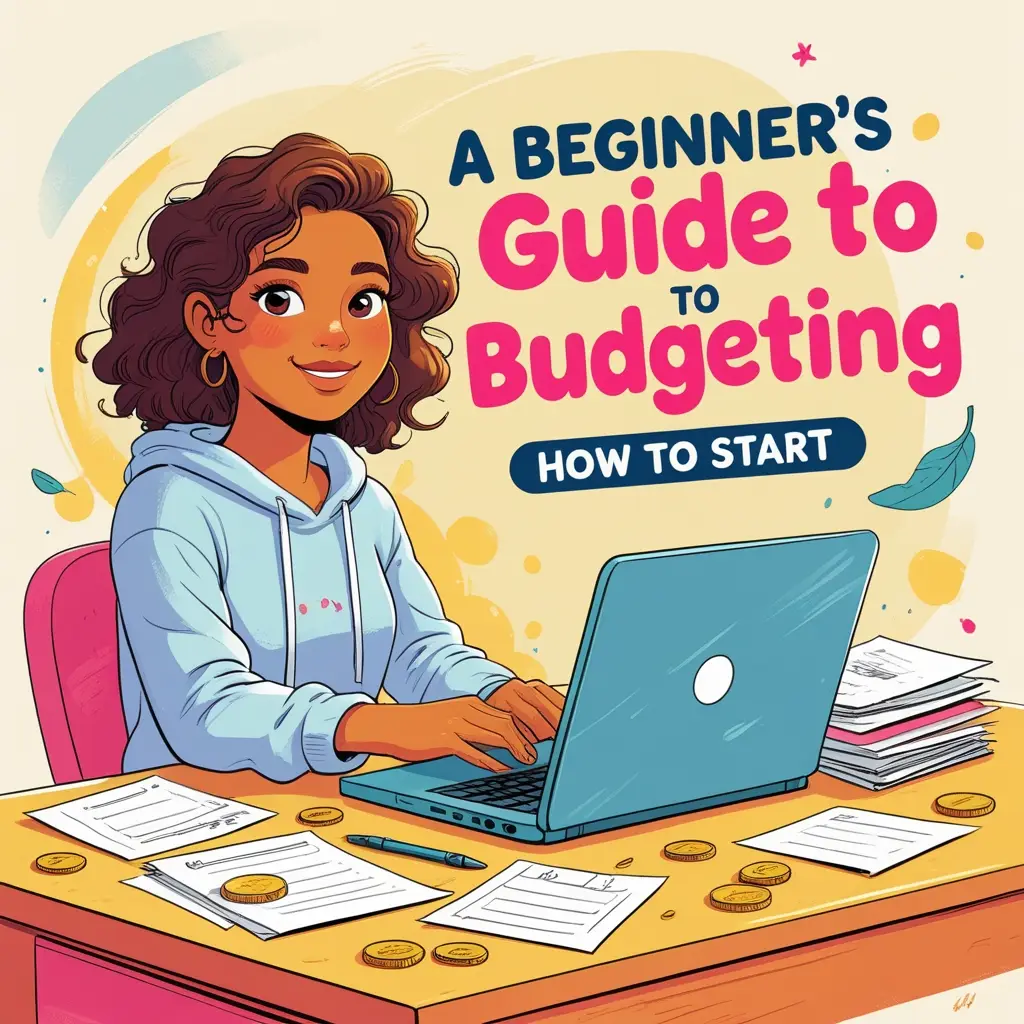Learning how to start budgeting is one of the most important skills. You can develop for your financial future. This post is all about “How to Start Budgeting – A Beginner’s Guide.”
Whether you’re just starting your career, trying to pay off debt, or saving for a big goal. Here Budgeting helps you understand where your money goes and how to make it work better for you.
Many people think budgeting is complicated or restrictive. But it’s actually quite simple and gives you more freedom with your money. When you have a budget, you know exactly how much you can spend on different things without worrying about running out of money or going into debt.
This guide will walk you through everything you need to know about budgeting, from the very basics to advanced tips that will help you master your finances. By the end, you’ll have all the tools and knowledge you need to create and stick to a budget that works for your lifestyle.
What is Budgeting?
A budget is simply a plan for your money. It shows how much money you expect to receive (your income) and how you plan to spend it (your expenses). Think of it as a roadmap that helps you navigate your financial journey without getting lost or running out of gas.
The basic idea is straightforward: you write down all the money coming in, subtract all the money going out. And make sure you don’t spend more than you earn. If you do this consistently, you’ll avoid debt and can even start saving money for your future goals.
Why Budgeting Matters
- Helps you avoid overspending and debt
- Shows you where your money is actually going
- Helps you save for important goals
- Reduces financial stress and anxiety
- Gives you control over your financial future
Getting Started: Your First Budget
Step 1: Calculate Your Income
Start by figuring out how much money you receive each month. This includes your salary, any side jobs, government benefits, or other regular income. Use your take-home pay (after taxes) rather than your gross salary, since that’s the actual money you can spend.
If your income varies from month to month, use the average of the last few months or use the lowest amount to be safe. It’s better to underestimate your income than to overestimate it and end up short on money.
Step 2: List Your Expenses
Next, write down everything you spend money on. It helps to divide expenses into two categories:
Fixed Expenses (Same every month)
- Rent or mortgage payment
- Car payment
- Insurance premiums
- Phone bill
- Internet service
- Loan payments
Variable Expenses (Change each month)
- Groceries
- Gas for your car
- Utilities (electricity, water)
- Entertainment
- Dining out
- Clothing
Step 3: Track Your Spending
For at least one month, write down every penny you spend. You can use a notebook, a phone app, or a simple spreadsheet. This step is crucial because most people underestimate how much they spend on small things like coffee, snacks, or apps.
Don’t try to change your spending habits during this tracking period. Just observe and record everything. You might be surprised by what you discover about your spending patterns.
Step 4: Do the Math
Now subtract your total expenses from your total income. The result tells you a lot:
Positive number: Great! You’re spending less than you earn and can save the difference.
Zero: You’re breaking even, but you need to find ways to save for emergencies.
Negative number: You’re spending more than you earn and need to make changes immediately.
Popular Budgeting Methods
The 50/30/20 Rule
This is one of the simplest budgeting methods. You divide your after-tax income into three categories:
- 50% for needs: Rent, groceries, utilities, minimum debt payments
- 30% for wants: Entertainment, dining out, hobbies, non-essential shopping
- 20% for savings and debt: Emergency fund, retirement, extra debt payments
This method works well for beginners because it’s simple and flexible, but you might need to adjust the percentages based on your specific situation.
Zero-Based Budgeting
With this method, you assign every dollar of your income to a specific category until you reach zero. This doesn’t mean you spend everything – some categories are for savings and investments.
This method gives you complete control over your money and helps ensure you’re being intentional with every dollar you earn.
Envelope Method
This cash-based system involves putting money for different categories into separate envelopes. When an envelope is empty, you’re done spending in that category for the month.
While you can do this with actual envelopes and cash, many people use digital versions through banking apps or budgeting software.
Essential Budgeting Tips
Start Small and Simple
Don’t try to track every penny from day one. Start with major categories and add detail as you get comfortable with the process.
Build an Emergency Fund
Start with a goal of Rs2500-Rs100000 for small emergencies. Then work toward 3-6 months of expenses for major emergencies.
Review and Adjust Regularly
Check your budget weekly and adjust monthly. Your needs will change, and your budget should change with them.
Use Technology to Help
Apps and online tools can automatically track spending and categorize expenses, making budgeting much easier.
Don’t Be Too Restrictive
Include some money for fun and unexpected expenses. A budget that’s too tight is hard to stick to and often leads to giving up entirely.
Focus on Big Wins First
Look for large expenses you can reduce (like housing or car payments) before worrying about small daily expenses.
Advanced Budgeting Strategies
Automate Your Finances
Set up automatic transfers to your savings account right after payday. This “pay yourself first” approach ensures you save money before you have a chance to spend it. Also automate bill payments to avoid late fees and simplify your monthly routine.
Use the 24-Hour Rule
Before making any non-essential purchase over $50, wait 24 hours. For larger purchases, wait a week. This cooling-off period helps you avoid impulse buying and ensures you’re making thoughtful spending decisions.
Track Your Net Worth
Beyond just budgeting monthly income and expenses, track your overall financial health by calculating your net worth (assets minus debts) every few months. This gives you a bigger picture view of your financial progress.
Plan for Annual Expenses
Don’t let yearly expenses like car registration, insurance premiums, or holiday spending derail your budget. Calculate these annual costs and set aside money each month so you’re prepared when they come due.
Top 15 Educational Mobile Apps for All Ages
Use Multiple Savings Accounts
Consider opening separate savings accounts for different goals (emergency fund, vacation, car replacement, etc.). This makes it easier to track progress toward specific goals and reduces the temptation to spend money earmarked for one purpose on something else.
Common Budgeting Mistakes to Avoid
Being Too Perfectionist
Don’t expect your budget to be perfect from the start. It takes time to get accurate estimates and develop good habits. Focus on progress, not perfection.
Forgetting Small Expenses
Small, regular expenses like coffee, apps, or snacks can add up quickly. Make sure to account for these in your budget or you’ll consistently overspend.
Not Planning for Fun
A budget that doesn’t include money for entertainment and enjoyment is unrealistic and hard to maintain. Include reasonable amounts for the things you enjoy.
Giving Up After One Bad Month
Everyone goes over budget sometimes, especially when starting out. Learn from what went wrong, adjust your budget if needed, and keep going.
Conclusion: – Your Budgeting Journey
Starting a budget might seem overwhelming at first but remember that every financial expert started exactly where you are now. The most important step is simply to begin. You don’t need to have everything figured out perfectly – you just need to start tracking your money and making conscious decisions about how you spend it.
Budgeting is not about restricting yourself or eliminating all fun from your life. It’s about understanding your money so you can spend it on what truly matters to you while still securing your financial future. When you have a budget, you can enjoy that dinner out or buy those shoes without guilt because you know it fits within your plan.
Remember that budgeting is a skill that improves with practice. Your first budget won’t be perfect, and that’s completely normal. Each month, you’ll get better at estimating expenses, identifying spending patterns, and making adjustments. Be patient with yourself and celebrate small wins along the way.
The habits you build today will serve you for the rest of your life. Whether you’re trying to pay off debt, save for a house, build an emergency fund, or just stop living paycheck to paycheck, budgeting is the foundation that makes all other financial goals possible.
Take action today, even if it’s just writing down what you spent yesterday. Your future self will thank you for taking control of your finances and building a budget that works for your life. Financial freedom isn’t about making more money – it’s about making the money you have work better for you.
Start Your Budgeting Journey Today!




